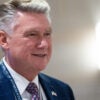
MOSCOW — Premier Vladimir Putin’s three-hour-plus interaction with the Russian populace showed that the prime minister rather than President Dmitry Medvedev remains in charge of the national leadership. Putin answered questions dealing with the issues both falling directly within his purview as head of the Russian Cabinet and those concerning foreign and defense policies that is the president’s bailiwick under the Constitution.
Clearly, the Premier’s chief objective was to convince the population that the government can control the economic crisis in the country and is doing its utmost to support business and the population, namely, to assuage popular concerns.
The questions that came Putin’s way clearly indicated the paternalist nature of people’s expectations — most of Russians are even less prone to self-reliance in the grip of a crisis and are pinning their hopes entirely on the government bailout. Putin readily exploited this trend and generously dispensed pledges of government support to virtually every category of citizens.
This shows some inertia of Putin’s brainwork. He is still thinking in anti-crisis-period categories when Russia enjoyed seemingly inexhaustible financial resources. The circumstances have drastically changed, though. It looks as if Putin has yet to realize the government will be incapable of meeting its past social commitments let alone honoring its new pledges.
Paragovernmental media outlets commended Putin for demonstrating an excellent grasp on statistical data on a broad range of economic and social issues. Indeed, Putin easily handled a great many figures, but certain data he quoted are somewhat doubtful. Putin believes the number of the unemployed is going to rise to 2 million people, while according to the Russian Statistics Agency’s data and the ILO methodology, the Russian unemployed are already numbering 4.6 million people.
Putin recognized that the country is in the grip of a flaming inflation which is likely to top 13.5% in 2008. However, he failed to mention the inflation rates have significantly overshot the 2008 inflation target of 8.5%. Putin‘s attempts to blame the world crisis that engulfed the country for Russia’s climbing inflation are questionable. The major surge in inflation was noted before last August, i.e. prior to the crisis.
The foreign policy section of Putin’s televised question-and-answer session was hardly impressive. The prime minister sent a clear signal that Moscow is determined to nudge President-elect Barack Obama into making serious concessions to Moscow on the key issues, primarily, on missile defenses and the NATO enlargement.
Putin’s most recent call-in show was a record breaker in that it lasted the longest. His popularity rates are continuing high. Medvedev — unlike Putin — has yet to attempt a similar interaction with such a massive audience. Curiously, throughout his 3-hour-long performance Putin referred to Medvedev just once, and only in passing.
All these aspects of Putin’s talk show confirm the likelihood of the following scenario: Medvedev announces an early presidential election to transfer power over to Putin. The grounds for such a move could be a newly emerging environment — a result of the constitutional amendments extending the presidential term. Considered in this light, Putin’s live call-in show could be construed as a significant bid for a presidential comeback. In any event, Putin still maintains the grip on power.


























